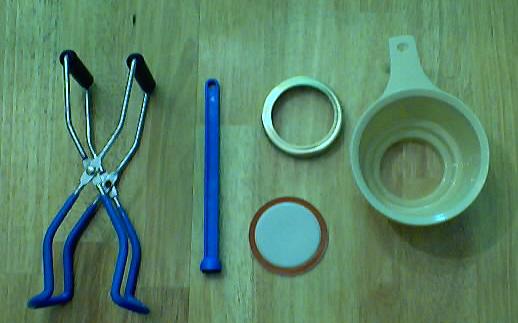
Looking for How to Make Zucchini Pickles (Pickled Dill Zucchini) in 2025? Scroll down this page and follow the links. And if you bring home some fruit or vegetables and want to can, freeze, make jam, salsa or pickles, see this page for simple, reliable, illustrated canning, freezing or preserving directions. There are plenty of other related resources, click on the resources dropdown above. If you are having a hard time finding canning lids, I've used these, and they're a great price & ship in 2 days.
If you have questions or feedback, please let me know! There are affiliate links on this page. Read our disclosure policy to learn more.
How to Make Zucchini Pickles (Pickled Dill Zucchini)
How to Make Zucchini Pickles (Pickled Dill Zucchini)
Yield: 4 half-pint (8 ounce) jars (you can double or triple this batch)
Click here for a PDF print version (coming soon)
Making and canning your own zucchini pickles or pickled zucchini is very easy and inexpensive with this traditional and tested (USDA / Ball Blue Book) recipe. Anyone with a garden knows you will soon have more zucchini that you can eat or give away, so here's a way to preserve (pickle) them to enjoy in the cold winter months. And it's less than $1 per pint jar! Here's how to do it, in easy steps and completely illustrated. It is much faster than the old method your grandmother used with tons of pickling salt and de-scumming the brine! Ugh! This method is so easy, ANYONE can do this! It's a great thing to do with your kids!
If you want to make bread-and-butter zucchini pickles click here, or cucumber bread and butter pickles, see this page instead or click here for a bread-and-butter zucchini pickle recipe. And see this page for a great and easy Zucchini Bread!
Ingredients
- 2 pounds of fresh zucchini, sliced lengthwise (that's about 8 small zucchinis)
- 1/3 pound quartered onions
- 1/4 cup canning or pickling salt
- 3 cups white vinegar (5%)
- 3 teaspoons finely chopped dill
- 1 teaspoon celery seed
Equipment
- 1 Water Bath Canner (a huge pot to sanitize the jars after filling (about $30 to $35 at mall kitchen stores, sometimes at big box stores and grocery stores.). Note: we sell many sizes and types of canners for all types of stoves and needs - see canning supplies
- Half pint canning jars (Ball or Kerr jars can be found at grocery stores, like Safeway, Publix, Kroger, grocery stores, even online - about $13 per dozen 8-ounce jars, more for quilted design or larger jars, including the lids and rings).
- Lids - thin, flat, round metal lids with a gum binder that seals them against the top of the jar. They may only be used once.
- Rings - metal bands that secure the lids to the jars. They may be reused many times.
- Jar grabber (to pick up the hot jars)
- Lid lifter (I like the lid rack that holds 12 lids or you can pull them out one at a time with the lid-lifter that has a magnet from the almost-boiling water where you sanitize them. ($4 at Target, other big box stores, and often grocery stores; and available online - see this page)
- Jar funnel ($5 at Target, other big box stores, and often grocery stores; and available online - see this page)
- 1 large pot; Nonstick ceramic coated pots for easy cleanup.
- Large spoons and ladles,
Directions - Step by Step
Step 1 - Slice the zucchini and onions
Just slice of 1/8 inch from each end, then slice them lengthwise, into quarters. Slice the ends off the onions and cut them into quarters (it's not a problem if the quartered onions then fall apart)
Step 2 - Salt the zukes and onions and let stand.
Combine the sliced zucchini and onions in a bowl with the 1/4 cup of canning or pickling salt. Add enough cold water to cover them. Let the mix stand for 2 hours.
Step 3 - Drain
Drain (and discard) the liquids from the zucchini and onions. Rinse the zucchini and onions thoroughly in a colander or drainer.
Step 4 - Mix the spices, vinegar and heat
In a large stainless steel, enamel, or lined pot, combine the
- 3 cups white vinegar (5%)
- 3 teaspoons finely chopped dill
- 1 teaspoon celery seed
and bring to a boil.
Step 5 - Add the zucchini and onions to the pot, simmer 10 minutes
Add the zucchini and onions and simmer for 10 minutes.
Step 6 - Fill the canning jars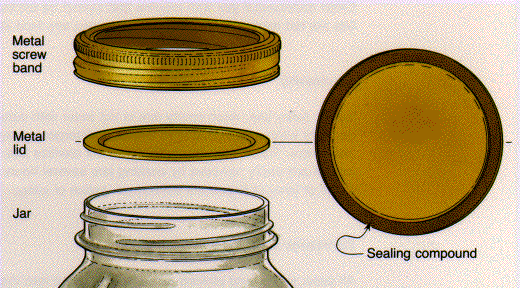
Fill the jars with zucchini/onion mixture, leaving 1/2 inch headspace. then fill the void (air space) with the hot pickling solution from mixture up to the 1/2 inch headspace. Some people like to add a tablespoon of Ball "pickle crisp" to each jar now, to help the pickles remain crispy.

Step 7 - Canning
There are two methods to can the pickles, the usual water bath and a low temperature pasturization method. The latter method produces more crisp pickles, but is more involved.
Option 1 Process in the water bath canner
Put the lids and rings on the jar, gently snug-tight, put them in the rack and lower into the water bather canner, which should be about 2/3 full of boiling water at a full boil. The jars should be convered by at least an inch of water. Bring the water back to a boil (if you have it on high heat, that shouldn't take but a minute or two) and then start timing, according to your altitude (at sea level up to 1,000 ft, 15 minutes).
Adjust lids and process according to the recommendations in the table below or use low-temperature pasteurization treatment. see option 2, "Low-Temperature Pasteurization Treatment,".
Remove from the canner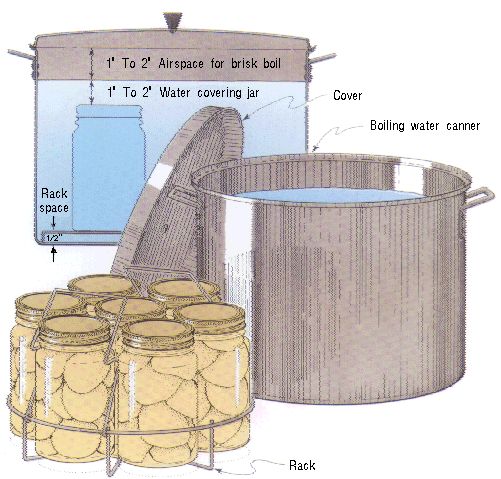
Remove the jars, let them cool in a draft-free place, and then store in a cool, dark place. They will be good for up to a year. After that, the taste declines, but they're still safe, if the seals are intact and there are no signs of spoilage. spoilage.
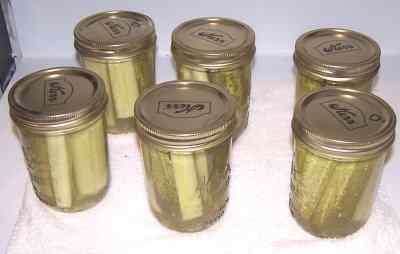
Option 2 - Low-Temperature Pasteurization Treatment
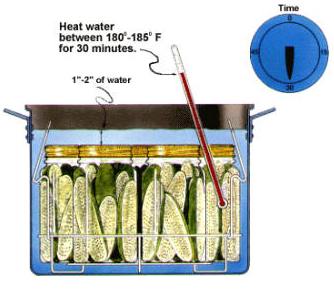
The following treatment results in a better product texture but must be carefully managed to avoid possible spoilage.
- Place jars in a canner filled half way with warm (120º to 140ºF) water.
- Then, add hot water to a level 1 inch above jars.
- Heat the water enough to maintain 180º to 185º F water temperature for 30 minutes. Check with a candy or jelly thermometer to be certain that the water temperature is at least 180ºF during the entire 30 minutes. Temperatures higher than 185ºF may cause unnecessary softening of pickles.
Pickle Making Problems?
See this page for a more complete set of frequently asked pickling questions and answersand answers
Summary - Cost of Making Homemade Zucchini Pickles - makes 12 pint jars, 16 oz each* |
||||
| Item | Quantity | Cost in 2019 | Source | Subtotal |
| Zucchini | 30-36 (about 2 small per pint jar) | free from the garden or a neighbor, or $3.00 at a PYO | Pick your own | $0 |
| Canning jars (pint size, wide mouth), includes lids and rings | 12 jars | $10.00/dozen | Grocery stores (Publix, Kroger, Safeway, etc.) | $10.00 |
| Vinegar | 4 cups | $0.99 | Safeway, Publix, Kroger, grocery stores |
$0.99 |
| Spices, sugar | See above | $3.00 | Grocery stores (Publix, Kroger, Safeway, etc.) | $3.00 |
| Total | $11.75 total or about $0.98 per jar INCLUDING the jars - which you can reuse! |
|||
| * - This assumes you already have the pots, pans, ladles,, and reusable equipment. Note that you can reuse the jars! Many products are sold in jars that will take the lids and rings for canning. For example, Classico Spaghetti sauce is in quart sized jars that work with Ball and Kerr lids and rings. Note that the Classico's manufacturer does not recommend reuse of their jars: see what they have to say on this page: | ||||
How to make other pickles - recipes and instructions:
- Refrigerator pickles (no canning required)
- Cucumber pickle relish
- Pickled beets
- Pickled green beans
- Pickled dilled okra
This document was adapted from the "Complete Guide to Home Canning,"
Agriculture Information Bulletin No. 539, USDA, revised 2006.
Reviewed May 2009.
Tips
Comments and Feedback
Illustrated Canning, Freezing, Jam Instructions and Recipes
[ Easy Home Canning] [FAQs - Answers to common questions and problems] [Recommended books about home canning, jam making, drying and preserving!] [Free canning publications to download and print]
Canning Books, Supplies and Accessories
These are my favorite essential canning tools, books and supplies. I've been using many of these for over 50 years of canning! The ones below on this page are just the sampling of. my preferred tools. but you can find much more detailed and extensive selections on the pages that are linked below.
- Vacuum Foodsealers for freezing, dried foods, and refrigerated foods - the FoodSaver line
- Selecting a KitchenAid mixer and attachments for home canning
- Steam Juicers
- Strainers, pit removers, seed-skin-stem removers, jelly strainers, etc. All types, makes and prices (from $19 to $350)
- Cherry pitters reviews, prices and ordering
- Food dehydrators - easy and fast to dry your own fruits, veggies, sun-dried tomatoes, etc.
The All New Ball Book Of Canning And Preserving: Over 350 of the Best Canned, Jammed, Pickled, and Preserved Recipes Paperback
This is THE book on canning! My grandmother used this book when I was a child.; It tells you in simple instructions how to can almost anything; complete with recipes for jam, jellies, pickles, sauces, canning vegetables, meats, etc.
If it can be canned, this book likely tells you how! Click on the link below for more information and / or to buy (no obligation to buy)The New Ball Blue Book of Canning and Preserving
Canning and Preserving for Dummies by Karen Ward
This is another popular canning book. Click here for more information, reviews, prices for Canning and Preserving For Dummies
Of course, you do not need to buy ANY canning book as I have about 500 canning, freezing, dehydrating and more recipes all online for free, just see Easy Home Canning Directions.
Home Canning Kits
See here for related tools, equipment, supplies on Amazon See here for related tools, equipment, supplies on Amazon
I have several canners, and my favorite is the stainless steel one at right. It is easy to clean and seems like it will last forever. Mine is 10 years old and looks like new.
The black ones are the same type of standard canner that my grandmother used to make everything from applesauce to jams and jellies to tomato and spaghetti sauce.
This complete kit includes everything you need and lasts for years: the canner, jar rack, Jar grabber tongs, lid lifting wand, a plastic funnel, labels, bubble freer, It's much cheaper than buying the items separately. It's only missing the bible of canning, the Ball Blue Book.
You will never need anything else except jars & lids (and the jars are reusable)!
The complete list of canners is on these pages:
- Water bath canners - Good for acidic foods, like applesauce, pickles, salsa, jams, jellies, most fruits
- Pressure canners - needed for low and non-acidic foods, like canned vegetables (corn, green beans, etc), and meats
- Canners for glass top stoves if you have a glass or ceramic stove
- Canners for induction stovetops
Pressure Canners
If you plan on canning non-acidic foods and low acid foods that are not pickled - this means: meats, seafood, soups, green beans corn, most vegetables, etc., then you ABSOLUTELY must use a Pressure Canner.
Of course, you can use a pressure canner as a water bath canner as well - just don't seal it up, so it does not pressurize. This means a Pressure Canner is a 2-in-1 device. With it, you can can almost ANYTHING.
There are also other supplies, accessories, tools and more canners, of different styles, makes and prices, click here!
Basic Canning Accessories
From left to right:
- Jar lifting tongs to pick up hot jars
- Lid lifter - to remove lids from the pot of boiling water (sterilizing )
- Lids- disposable - you may only use them once
- Ring - holds the lids on the jar until after the jars cool - then you remove them, save them and reuse them
- Canning Jar funnel - to fill the jars
FREE Illustrated Canning, Freezing, Jam Instructions and Recipes
Don't spend money on books. that you don't need to. Almost everything you can find in some book sold online or in a store is on my website here for free. Start with theEasy Home Canning Directions below. That is a master list of canning directions which are all based upon the Ball Bblue book, the National Center for Home Food Preservation and other reputable lab tested recipes. Almost every recipe I present in addition to being lab tested com. is in a step by step format with photos for each step and complete. explanations. that tell you how to do it, where to get the supplies and pretty much everything you need to know. In addition, there almost always in a PDF format so you can print them out and use them while you cook.
[ Easy Home Canning Directions]
[FAQs - Answers to common questions and problems]
[Recommended books about home canning, jam making, drying and preserving!]
Looking for canning equipment and supplies?
Water bath canner with a jar rack
Pressure canners for gas, electric and induction stoves: Presto 23Qt or T-fal 22Qt
Canning scoop (this one is PERFECT)
Ball Blue book (most recent version)
Jars: 8oz canning jars for jams
Find Other types of farms:
Farm markets and roadside stands
Road trips and camping resources
Local Honey, apiaries, beekeepers
Consumer fraud and scams information
Home canning supplies at the best prices on the internet!
Maple Syrup Farms, sugarworks, maple syrup festivals
Environmental information and resources
Farms For Your Event for birthday parties, weddings, receptions, business meetings, retreats, etc.
Festivals - local fruit and vegetable festivals
Get the
most recent version of
the Ball Blue Book
With this Presto 23 quart pressure canner and pressure cooker, you can "can" everything, fruits, vegetables, jams, jellies, salsa, applesauce, pickles, even meats, soups, stews. Model 01781

You can make jams, jellies, can fruit, applesauce, salsa and pickles with water bath canners, like this Granite Ware 12-Piece Canner Kit, Jar Rack, Blancher, Colander and 5 piece Canning Tool Set


